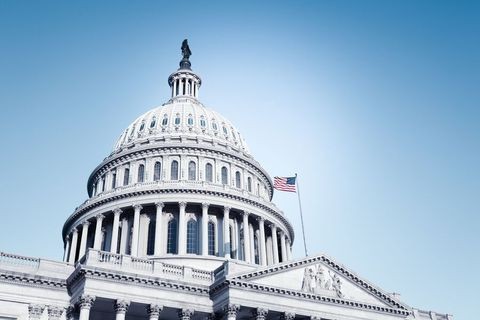Endangered Species and Wildlife Protection
Overview
Wildlife protection laws have become a weapon of choice for opponents of even the most carefully considered private, commercial, and public development projects. In this litigious atmosphere, landowners, developers, trade associations, and state and local governments need legal counsel that can help them achieve sensible, sustainable growth.
Contacts
Insights
Firm News | 11 min read | 06.05.25
Crowell Attains Leading Rankings in Chambers USA 2025
Washington – June 5, 2025: Crowell & Moring earned 80 rankings for 71 lawyers, as well as 43 national and statewide practice area rankings, in the Chambers USA 2025 guide. The rankings are driven by independent interviews of clients and lawyers at peer firms.
Client Alert | 2 min read | 01.22.25
Trump Issues Executive Order Directing Drastic Clampdown on Offshore Wind Leasing
Webinar | 01.12.23
Speaking Engagement | 01.12.23
“What Will the New Year Bring for Government Contractors?” Crowell & Moring Webinar, 2023
Representative Matters
- Representing the Edison Electric Institute, the American Petroleum Institute, and other parties defending the ESA section 4(d) special rule for the polar bear, which declines to use the ESA to regulate greenhouse gas emissions. Crowell & Moring attorneys also assisted EEI in preparing comments supporting that special rule. And our attorneys have written on why certain effects of greenhouse gas emissions cannot be addressed under the ESA.
- Representing CropLife America and the American Farm Bureau Federation in contentious litigation on whether EPA's registration of pesticides has conformed with § 7(a)(2) of the ESA.
- Preparing amicus briefs on the winning side for two national trade associations (the American Farm Bureau Federation and CropLife America) in National Ass'n of Home Builders v. Defenders of Wildlife, 551 U.S. 644 (2007). In that hard-fought 5-4 decision, the majority held that ESA § 7(a)(2) did not apply to EPA's decision under § 402(b) of the Clean Water Act in transferring NPDES permitting authority to the State of Arizona.
- Litigating allegations of ESA "take" brought against wind energy developers, land developers, timber companies, and state regulators.
- Litigating the leading case on ESA "take" for the timber industry. In Sweet Home,the Supreme Court sustained the "harm" rule, but under narrowing interpretations which make it more difficult to prove that an enjoinable "take" of listed wildlife would occur.
- Counseling major oil companies on compliance with the ESA, MMPA, and MBTA. Preparing rulemaking comments for numerous trade associations and companies on issues under the ESA and BGEPA.
- Representing a state government in consolidated multidistrict litigation concerning ESA issues in management of water reservoirs by the U.S. Army Corps of Engineers.
- Successfully representing oil interests and timber interests in limiting the scope of the 1918 MBTA. See Newton County Wildlife Association v. U. S. Forest Service, 113 F.3d 110 (8th Cir. 1997); and United States v. Brigham Oil & Gas L.P., 840 F. Supp. 2d 1202 (D.N.D. 2012).
- Counseling a major utility on avian protection policies.
- Submitting an amicus brief on the winning side in the Supreme Court case (Bennett v. Spear) finding that companies could bring ESA citizen suits and clarifying that an ESA biological opinion is subject to judicial review.
Contacts
Insights
Firm News | 11 min read | 06.05.25
Crowell Attains Leading Rankings in Chambers USA 2025
Washington – June 5, 2025: Crowell & Moring earned 80 rankings for 71 lawyers, as well as 43 national and statewide practice area rankings, in the Chambers USA 2025 guide. The rankings are driven by independent interviews of clients and lawyers at peer firms.
Client Alert | 2 min read | 01.22.25
Trump Issues Executive Order Directing Drastic Clampdown on Offshore Wind Leasing
Webinar | 01.12.23
Speaking Engagement | 01.12.23
“What Will the New Year Bring for Government Contractors?” Crowell & Moring Webinar, 2023
Insights
Developments in ESA Citizen Suits and Citizen Enforcement of Wildlife Laws
|01.09.15
ABA Section of Environment, Energy, and Resources, Vol. 29, No. 3
Litigation Forecast 2013: What Corporate Counsel Need to Know for the Coming Year
|01.31.13
Crowell & Moring LLP publication
Insights
Firm News | 11 min read | 06.05.25
Crowell Attains Leading Rankings in Chambers USA 2025
Washington – June 5, 2025: Crowell & Moring earned 80 rankings for 71 lawyers, as well as 43 national and statewide practice area rankings, in the Chambers USA 2025 guide. The rankings are driven by independent interviews of clients and lawyers at peer firms.
Client Alert | 2 min read | 01.22.25
Trump Issues Executive Order Directing Drastic Clampdown on Offshore Wind Leasing
Webinar | 01.12.23
Speaking Engagement | 01.12.23
“What Will the New Year Bring for Government Contractors?” Crowell & Moring Webinar, 2023











